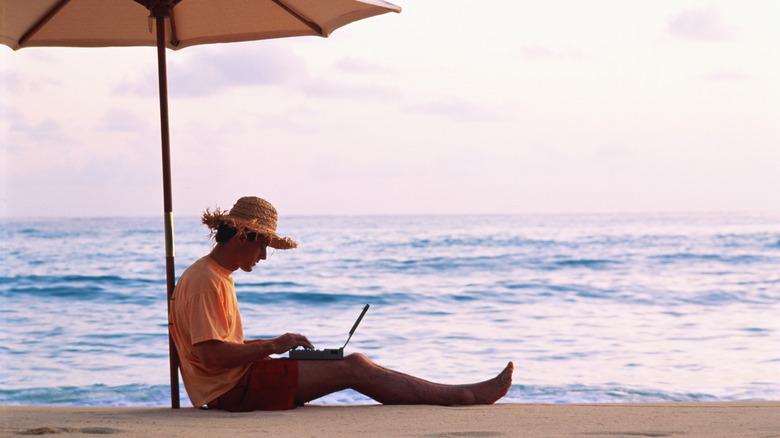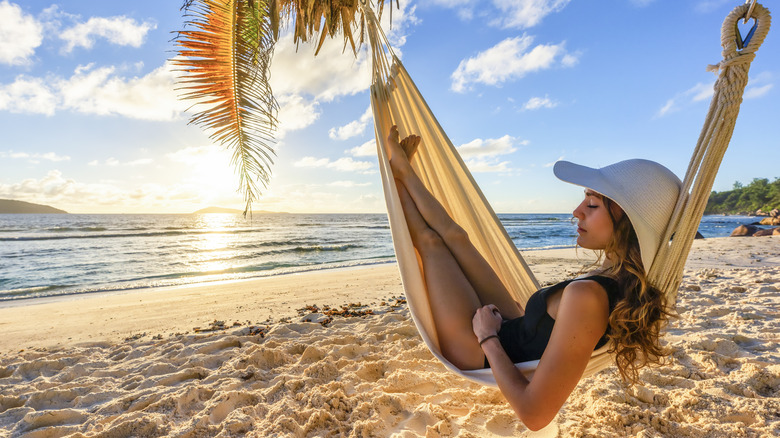The Best Ways To Completely Unplug While You're On Vacation
We may receive a commission on purchases made from links.
It's almost time for vacation, and you may be struggling with getting things settled so no one has reason to contact you while you're sipping cocktails on the beach. However, no matter how much prep you do, you may still be interrupted. Co-workers call for "just one thing," or email you with, "I know you're on vacation, but I have a quick question." You may even be working on the flight to your destination. This is because we live in a 24/7 world, and even if everyone respects your time, your own brain may not be used to putting devices away for vacation relaxation. How do you unplug?
Whether it's getting the world to leave you be or stopping yourself from checking email and social media, there are ways to do it, like drawing clear boundaries and deleting apps from your phone for a while. Helping us find ways to enjoy the present moment, especially on vacation, is licensed psychologist Dr. Janina Scarlet, author of "Unseen, Unheard, Undervalued: Managing Loneliness, Loss of Connection and Not Fitting In." Dr. Scarlet has great tips and advice for drawing lines around what we're willing to give, what we're not, and how to let our brains take a vacation along with our bodies.
Why we need to really unplug on vacation
We may really want to relax, but other people don't always respect the time we need. Dr. Scarlet suggests sending an email or text message letting people know the date that you'll be able to respond so they don't keep asking for your time while you're away. She also says we should take steps like turning off our phones or phone notifications, or even temporarily removing the email app. Even not taking the phone to, say, the beach helps. "The more barriers we can create between ourselves and maybe people that might intrude on our rest time ... the better an opportunity we have to truly take that opportunity to rest and recharge," she explains.
We're plugged in all the time, checking phones and emails, and even trying to combine work with sneaky vacations. While the office job of many years ago may have truly been 9-5, we're now reachable anywhere in the world, at any moment. Dr. Scarlet spoke about what happens when we don't give ourselves time to unplug, telling Islands, "If we think about our brains as almost like electronic devices ... what happens to our electronic devices when we don't allow them to recharge for an extended period of time? They're not gonna function very well, and eventually, they might shut down." She says this may lead to symptoms like brain fog and headaches, as well as concentration loss and irritation.
What if someone contacts you anyway while you're on vacation?
While we can simply choose not to respond to messages, that may cause us anxiety. Dr. Scarlet says there are two things we can do. First, if we've already given a response date, we should stick to it. Second, she suggests "journaling in two parts," where you split a paper in half. On one side, you write your frustrations about the interruptions. On the other side, Dr. Scarlet says, "Using the 'you' pronoun, you'd write yourself a compassionate and validating and supportive response such as, 'You're doing everything right. I know you need this break. And I know this person has violated your boundary. Just remember that you need this rest.' And so, basically, writing a compassionate response, the kind that you would write to a dear friend."
Sometimes there are things we can't avoid doing or people we absolutely have to speak to. In cases like these, Dr. Scarlet says we should create parameters for ourselves, like saying we're going to work from 10 a.m. to noon, and that's it. Then, even if we're not done, say to ourselves, "I'm closing the computer. I'm going to the pool. I'm gonna get lunch. I'm gonna go relax.'" She says it can actually motivate us more because we've given ourselves a parameter. We also have to be willing to let ourselves stop when we say we will.
Taking our own behavior into consideration
Even when others respect our vacation boundaries, it can be hard to let go of our day-to-day lives. Dr. Scarlet says that we have two choices. We can choose to answer those emails and take those calls, but in the end, that defeats the purpose of the vacation. Instead, we can decide to take the time to recharge and come back able to handle things with fresh eyes.
Social media is another thing to take a break from. Dr. Scarlet says it's a good idea to post on your account that you're taking a break and temporarily delete social media apps from your phone. "I think some of the benefits are that we're able to slow down, we're able to focus on just the task at hand instead of the millions of messages or posts that we might think we need to catch up with. We are focusing on our own healing, instead of maybe comparing ourselves to other people," she explains. Doing this "can allow our brain to work more efficiently, can allow us to reevaluate our sense of purpose, and consider how we want to show up for ourselves and others when we return from our break."



